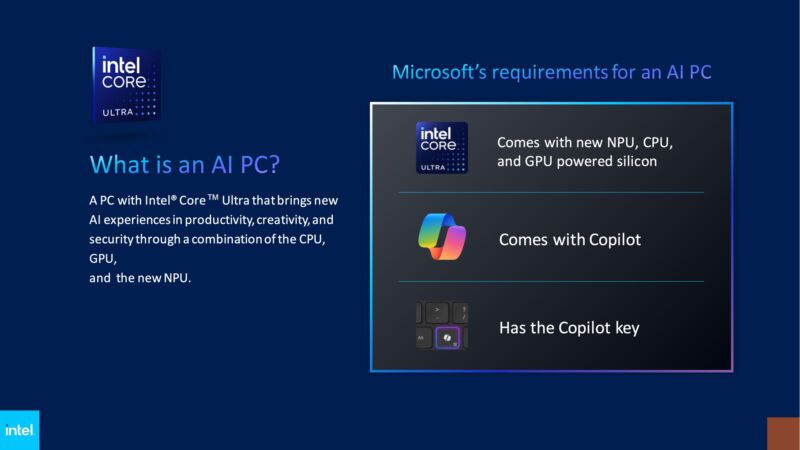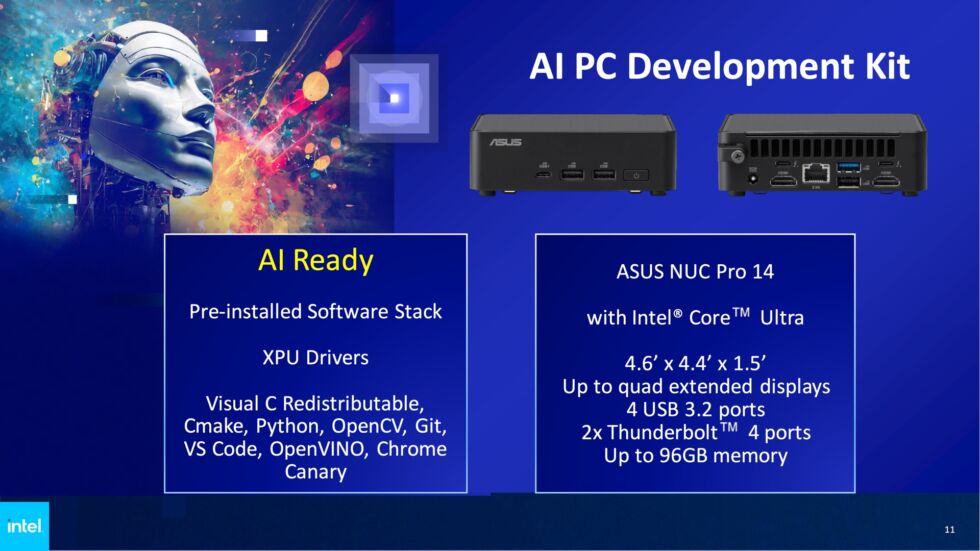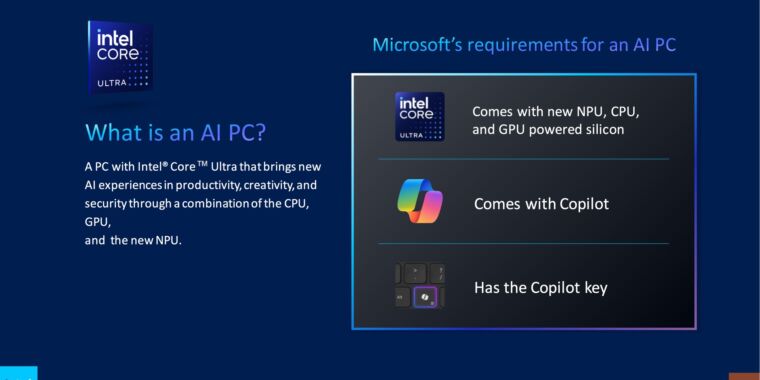
Intel
Microsoft said in January that 2024 would be the year of the “AI PC,” and we know that AI PCs will include a few hardware components that most Windows systems currently do not include—namely, a built-in neural processing unit (NPU) and Microsoft’s new Copilot key for keyboards. But so far we haven’t heard a whole lot about what a so-called AI PC will actually do for users.
Microsoft and Intel are starting to talk about a few details as part of an announcement from Intel about a new AI PC developer program that will encourage software developers to leverage local hardware to build AI features into their apps.
The main news comes from Tom’s Hardware, confirming that AI PCs would be able to run “more elements of Copilot,” Microsoft’s AI chatbot assistant, “locally on the client.” Currently, Copilot relies on server-side processing even for small requests, introducing lag that is tolerable if you’re making a broad request for information but less so if all you want to do is change a setting or get basic answers. Running generative AI models locally could also improve user privacy, making it possible to take advantage of AI-infused software without automatically sending information to a company that will use it for further model training.
Right now, Windows doesn’t use local NPUs for much, since most current PCs don’t have them. The Surface Studio webcam features can use NPUs for power-efficient video effects and background replacement, but as of this writing that’s pretty much it. Apple’s and Google’s operating systems both use NPUs for a wider swatch of image and audio processing features, including facial recognition and object recognition, OCR, live transcription and translation, and more.
Intel also said that Microsoft would require NPUs in “next-gen AI PCs” to hit speeds of 40 trillion operations per second (TOPS) to meet its requirements. Intel, AMD, Qualcomm, and others sometimes use TOPS as a high-level performance metric when comparing their NPUs; Intel’s Meteor Lake laptop chips can run 10 TOPS, while AMD’s Ryzen 7040 and 8040 laptop chips hit 10 TOPS and 16 TOPS, respectively.
Unfortunately for Intel, the first company to put out an NPU suitable for powering Copilot locally may come from Qualcomm. The company’s upcoming Snapdragon X processors, long seen as the Windows ecosystem’s answer to Apple’s M-series Mac chips, promise up to 45 TOPS. Rumors suggest that Microsoft will shift the consumer version of its Surface tablet to Qualcomm’s chips after a few years of offering both Intel and Qualcomm options; Microsoft announced a Surface Pro update with Intel’s Meteor Lake chips last week but is only selling it to businesses.

Intel
All of that said, TOPS are just one simplified performance metric. As when using FLOPS to compare graphics performance, it’s imprecise and won’t capture variations in how each NPU handles different tasks. And the Arm version of Windows still has software and hardware compatibility issues that could continue to hold it back.
As part of its developer program, Intel is also offering an “AI PC development kit” centered on an Asus NUC Pro 14, a mini PC built around Intel’s Meteor Lake silicon. Intel formally stopped making its NUC mini PCs last year, passing the brand and all of its designs off to Asus. Asus is also handling all remaining warranty service and software support for older NUCs designed and sold by Intel. The NUC Pro 14 is one of the first new NUCs announced since the transition, along with the ROG NUC mini gaming PC.


















